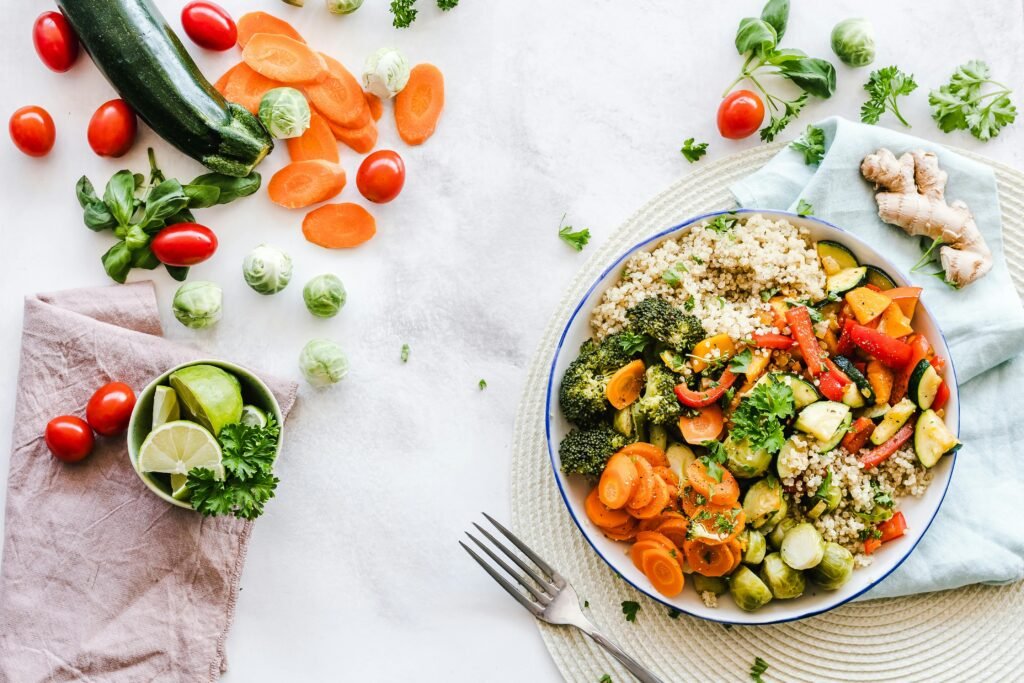Let’s talk about your gut—not exactly the most glamorous topic, but wow, is it important! Gut health isn’t something we usually think about—and that’s okay. I mean, who really sits around pondering their digestive system, right? But here’s the thing: if you’ve ever felt bloated after meals, hit with random fatigue, or noticed breakouts that felt like high school all over again, your gut might be trying to tell you something.
I didn’t give my gut much thought until a pizza night left me bloated, tired, and miserable. That’s when I started digging into gut health—and boy, was it eye-opening. Your gut isn’t just about digestion; it’s like the command center of your body, influencing everything from your immune system to your mood. The good news? Improving your gut health naturally is totally doable—and might even be fun.
This post contains affiliate links, meaning I may earn a small commission if you purchase through my links at no extra cost to you. As an Amazon Associate, I earn from qualifying purchases. It helps keep this blog running, so thanks for your support!

What Is Gut Health?
At its core, gut health is all about the balance and function of your gastrointestinal system—including your stomach, intestines, and colon. This system is home to trillions of microorganisms, mostly bacteria, that make up your gut microbiome. These tiny helpers play a crucial role in breaking down food, absorbing nutrients, and keeping your immune system strong. Fun fact: your large intestine alone hosts over 200 species of bacteria, viruses, and fungi. While some can be harmful, most are beneficial—and absolutely essential for a healthy body.
Our gut microbiome works in harmony with us: we provide food and shelter, and they help keep us healthy. The gut is often called the “second brain” because it’s closely connected to your nervous system. It even produces neurotransmitters like serotonin, which directly affect your mood and emotional well-being. A healthy gut doesn’t just aid digestion—it boosts energy, clears skin, and makes managing stress easier.
How can we improve our gut health?
If all this sounds complicated, don’t worry—it’s actually simpler than it seems. Improving your gut health takes just a few small tweaks to your daily habits. Think of it like tidying up a messy room: small changes can lead to big results. Whether it’s eating more gut-friendly foods, cutting back on processed ones, or managing stress better, you don’t have to overhaul your life overnight. Start with one change and build from there.
1. Take it Easy on the Sugary and Processed Stuff
Here’s the deal: your gut microbiome thrives on balance, and sugary, highly processed foods can throw everything out of whack. These foods often feed the “bad” bacteria in your gut, letting them overpower the beneficial ones. The result? You might feel bloated, sluggish, or caught in a loop of sugar cravings.
Your microbiome is like a native garden—when it’s healthy, everything thrives. But too much sugar and junk are like weeds, crowding out the good bacteria your body relies on. As microbial ecologist Jack Gilbert puts it, “If you eat a lot of sugar, you get sugar-loving bugs. If you eat a lot of fat, you get fat-loving bugs.” What you eat directly impacts the balance of your gut’s ecosystem.
The good news? Small, mindful changes can make a big difference. Start with simple swaps: grab fresh fruit when you’re craving sweets, or try nuts instead of chips for a crunchy snack. Grab a bowl of air-popped popcorn sprinkled with nutritional yeast during your Netflix marathon. Cooking more meals at home can also help you dodge hidden sugars in processed foods. By feeding your gut the right stuff, you’re giving it the tools to thrive—and as it gets healthier, those junk food cravings will start to fade.

2. Eat More Fiber, Like Your Grandma Told You
Fiber is your gut’s best friend. A diet rich in fiber acts like a broom for your gut, sweeping out toxins and keeping everything running smoothly. But here’s the catch—if you suddenly start eating a ton of fiber, your gut might freak out a bit (hello, bloating). So, go slow and steady.
Let’s say you’re hooked on avocado toast (because, who isn’t?). Swap out white bread for a hearty, fiber-packed whole grain. Top it with some spinach or a sprinkle of seeds, and bam—gut-friendly brunch.
Foods that are high in fibers are vegetables, beans and legumes, fruits, wholegrains, nuts and seeds.
Fiber-Rich Superstars:
- Quinoa bowls loaded with veggies
- Apple slices with almond butter
- Lentil soup on a cold day (comfort + gut health = win-win)

3. Probiotics & Prebiotics: The Dream Team
Probiotics are the good bacteria, and prebiotics are their snacks. You need both to keep your gut happy. Fermented foods like yogurt, kimchi, kombucha and miso are packed with probiotics.
Easy Ways to Sneak Them In:
- Probiotic: Start your day with plain yogurt (the kind with live cultures and unsweetened) and throw in some berries for a prebiotic boost.
- Prebiotic: Toss garlic and onions into pretty much anything you’re cooking. Your gut bacteria will thank you.
Pro Tip: If you’re not into kimchi or sauerkraut yet, try mixing a small amount into fried rice or tacos. You’ll barely notice it, promise.
4. Drink More Water… Seriously
Hydration isn’t just for glowing skin and avoiding headaches. It’s also key for a smooth-running gut. Imagine your gut trying to do its job without enough water—it’s like trying to wash dishes with just a trickle. Aim for 8 glasses a day, or more if you’re active.
Here’s a tip:
Keep a cute reusable water bottle on your desk. Bonus points if it’s one of those that tells you how much you’ve drunk by lunchtime, just like this one.
5. Stress Less, Love Your Gut More
Stress is the ultimate gut buzzkill. When you’re stressed, your gut bacteria get out of whack, which can lead to all kinds of issues.
Chill-Out Ideas:
- Take a 10-minute break to stretch or meditate (yes, even if it’s just sitting quietly in your car after work).
- Try a yoga class on YouTube.
- Or, if you’re like me, binge-watch your favorite sitcom—laughter is surprisingly good for your gut!
6. Move That Body
Exercise isn’t just for your abs or your heart. Turns out, it’s great for your gut too. Even simple activities like walking can boost your gut bacteria diversity.
If you’re sitting at a desk all day, try a quick lunchtime walk. Or, turn on some music and dance around your living room for 10 minutes. It’s fun and your gut will love it.
7. Listen to Your Gut (Literally)
Your body is pretty good at letting you know what’s up. If certain foods leave you feeling bloated or uncomfortable, make a note of it. Keeping a food diary can help you spot patterns.
If you’ve ever had a mystery tummy ache and thought, “Why did I eat that third slice of pizza?”… yeah, we’ve all been there. Learn from it and move on.
The Bottom Line
Improving your gut health doesn’t have to mean giving up everything you love or following some super-restrictive plan. Start small—add a veggie to your dinner, swap soda for water, or try that yoga class you’ve been eyeing.
And don’t forget to listen to your body—your gut will tell you what’s working (or not). Over time, these little changes can make a huge difference. When your gut is happy, you’ll feel the difference everywhere—from your energy levels to your skin.
And honestly? That’s worth a little effort.
Oh, and if you’re into Netflix documentaries, check out Hack Your Health: The Secrets of Your Gut. It’s an eye-opener about how your gut impacts your body and mind in ways you might not expect.

